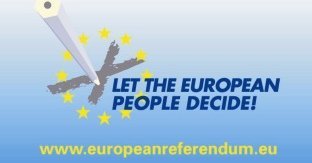Why launching such a campaign?
Many people have said and written on many occasions how crucial a truly democratic European Constitution is for our common future in Europe. All these very valid arguments shall not be repeated here. This is simply about why it makes sense at this moment in time to become active in a campaign for a European constitutional referendum.
The current situation is this: 18 states have ratified the Draft Constitution and in 2 states the ratification was rejected by national referenda. It is useless to lament today that three years ago the political decision makers didn’t have the guts to give all EU-citizens a chance to decide on the Draft Constitution in a European Referendum, even thought it was obvious to everyone that some national referenda would have to take place anyhow. But maybe we can at least learn from the experiences in France and the Netherlands, that it isn’t the best idea to have a national debate and vote on an issue of truly European significance.
Since all known current attempts to save the Constitution – in whichever reduced way, shape or form – will in any case lead to a new round of ratifications in all member states, it seems inevitable that some countries will have to hold referenda again. It is one aim of the campaign to convince as many people as possible that national referenda on the European Constitution will never lead anywhere.
By campaigning for a referendum we are also fighting for substance in the text, because some national referenda are required if the text has substance.
But there is another political reason to run this campaign at this point in time. It might surprise some, but the referendum issue has a substantial impact on the content of a new text, that quite possibly is going to be worked out by an IGC during the remainder of this year. It is obvious that some national governments are currently trying very hard to take everything out of the Draft Constitution, which would force a national referendum in one or more countries. One can only speculate about the motives of these deciders. Are they too scared or too lazy to explain a European Constitution to their citizens?
– There can be no changes to the current allocation of competencies
– The foreseen primacy of European law in respective competence areas will be deleted
– The foreseen European foreign minister will cease to exist
– Provisions on symbols (Hymn, Flag etc.) will be taken out
In this case one has every right to ask what remains of the original Draft Constitution AND if this solves any of the institutional problems that were described in the Laeken declaration at the beginning of this Constitutional process. From a federalists point of view such a minimal result would be unacceptable.
Yet this means that there is a direct link between the referendum issue and the content of the text. By campaigning for a referendum we are also fighting for substance in the text, because some national referenda are required if the text has substance. We are just taking the extra step and say that instead of national referenda it should be one European referendum.
Last but not least it would of course have huge symbolic meaning, if all EU-citizens vote on the same day on their Constitution in a European Referendum – it could turn out to be milestone on the way towards the often talked about “Citizens’ Europe”.
But is the demand for a European Referendum realistic at all?
To ask for a legally binding referendum would certainly be very unrealistic, but to hold a consultative referendum is quite possible. The only precondition would be the political will of the national governments. Not one country would have to change its constitution. Simple national laws would be sufficient to provide the legal groundwork for such a referendum.
The main point is: It requires a political will! And that’s what this campaign is all about. This is a political campaign – even if we manage to collect one million signatures, the referendum will not necessarily take place; there are also no legal automatisms that start clicking once one million signatures are collected. We can only make political statements – and for that purpose 1 Million signatures would be a very powerful stimulus.
How is this campaign working?
Above all this campaign is the first truly pan-European internet campaign of European federalists. Hopefully there will be many live actions in many places in Europe, but the focal point is clearly www.europeanreferendum.eu.
The progress of this campaign can continuously be tracked live by a look at the signature counter on the website. Of course, this counter makes our success very transparent. We are aware of the danger, but have very consciously chosen to take on this challenge.
Right from the start this has been and continues to be a truly European campaign. The coordinators live and work in Berlin, Torino, London, Brussels and Frankfurt. We are very happy about the current successes of the campaign (especially the website and the official campaign partners), but we know very well, that the biggest part of the campaign and the work still lies ahead of us.
Union of European Federalists (UEF)..., Young European Federalists (JEF Europe), New Europe, ECAS (European Citizen Action Service), Europa Nostra, Women Citizens of Europe Network (RCE), Generation Europe, Legambiente, Il Circolo Europa, Comune di Mignanego, International Network for Development, APEF
Valéry Giscard d’Estaing, France: President, Convention Européenne, Gérard Onesta, France: Parlement européen, Député Vert, Vice Président, Monica Frassoni, Italy: Parlamento europeo, Deputata, Carlos Carnero, Spain: PSOE, Eurodiputado

Follow the comments: |
|
